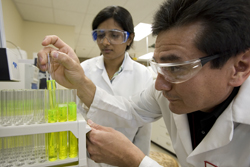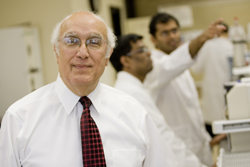Maximizing molecules
| Pharmacy is all about maximizing molecules to become therapeutic agents — when done successfully, the result is a drug that can make a profound difference in the lives of patients. Drugs that ultimately reach your medicine cabinet, however, are the product of a rigorous process that begins in laboratories such as the Moulder Center for Drug Discovery Research.
The center works with faculty and external collaborators to develop lead drug candidates while introducing Temple faculty and students to the process of modern drug discovery. Dedicated in May, the center was made possible through a $500,000 gift from Lonnie Moulder and his wife, Sharon, 1980 graduates of the School of Pharmacy. “We are so pleased to be able to give back to Temple, and we hope this gift adds to the educational mission of the center,” said Lonnie Moulder. |
 Ryan S. Brandenberg/Temple University
School of Pharmacy graduate student Sushma Savarla looks on as research scientist Roger Martinez checks on a purification process underway. Martinez also manages laboratory activities within The Moulder Center for Drug Discovery Research. |
|
At the center’s helm is director Magid Abou-Gharbia, who holds dual appointments as professor of medicinal chemistry in the School of Pharmacy and professor of chemistry in the School of Science and Technology. Before coming to academia, Abou Gharbia worked for more than two decades at Wyeth Pharmaceuticals, most recently serving as senior vice president of chemical and screening discovery research. He brings those 26 years of “big pharma” experience to Temple, including his leadership in the discovery and development of five marketed drugs and authorship of hundreds of publications and patents. Abou-Gharbia is joined by Roger Martinez, a bench chemist with several years of experience in the pharmaceutical industry. Together, they and their fellow researchers collaborate with faculty from the School of Medicine and the College of Science Technology to foster multi-disciplinary research. They also partner with external collaborators — from pharmaceutical powerhouses to biotech firms both in the U.S. and abroad — to stay on the forefront of drug design and lead optimization. |
|
 As director of the Moulder Center for Drug Discovery Research, Abou-Gharbia oversees graduate pharmacy students, like Sivakumar Annadurai and Richie Bhandare, researching projects within the center’s four labs. |
“We are literally making the drugs of tomorrow today,” said Abou-Gharbia. Perhaps the next drug used to help beat addiction or treat pet illness will be discovered inside the Moulder Center for Drug Discovery Research. These are among applications that are the focus of several projects now underway at the center, including: • Research with School of Pharmacy professor Scott Rawls on the effects of certain antibiotics on the glutamic acid neurotransmitter system. |
|
While Abou-Gharbia admits he doesn’t have an army of scientists like he had at Wyeth, he does have the equipment to perform parallel synthesis, which is the process of making multiple compounds in a reaction. Typically, chemists can make one or two a month; with parallel synthesis, Abou-Gharbia’s team can make anywhere from 50 to 300 a week. That’s an impressive feat for a modest operation that was established in 1901 and has thrived on the same entrepreneurial spirit steeped in the root of pharmacy ever since. In addition to one laboratory dedicated solely to parallel synthesis, the Moulder Center for Drug Discovery Research has three more medicinal chemistry labs, high-tech equipment and the talent needed to run those machines with more to come. “As we grow, the only challenge we really face is finding more space because this is just the beginning,” said Abou-Gharbia. “I predict and expect some productive relationships and research to come from what we’re doing here.” |
|